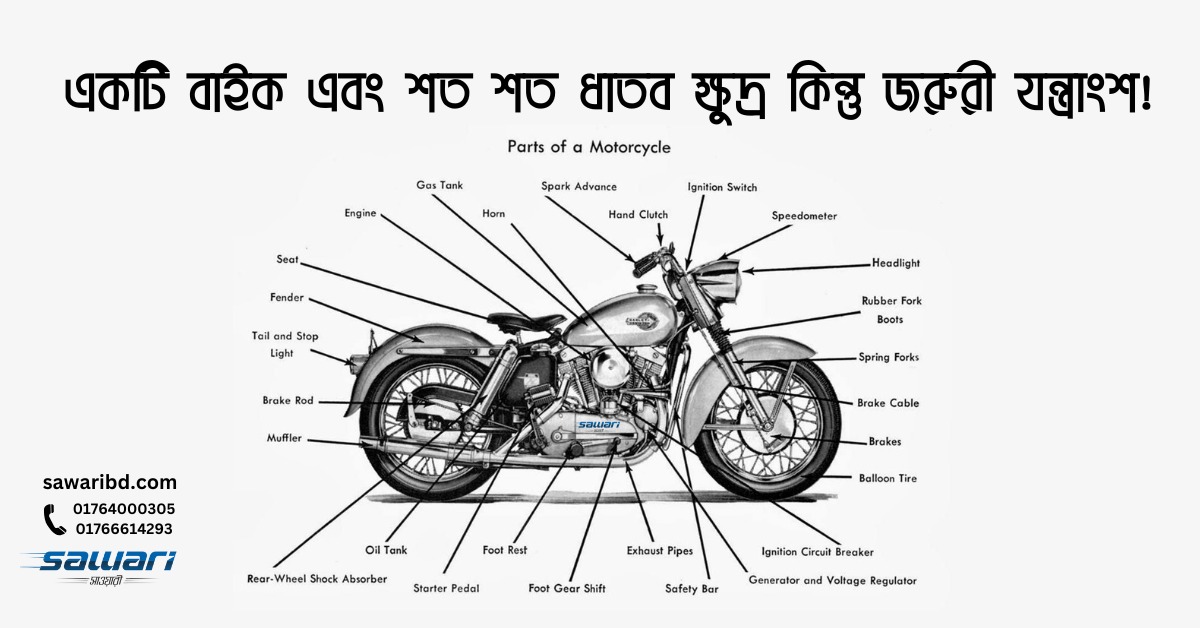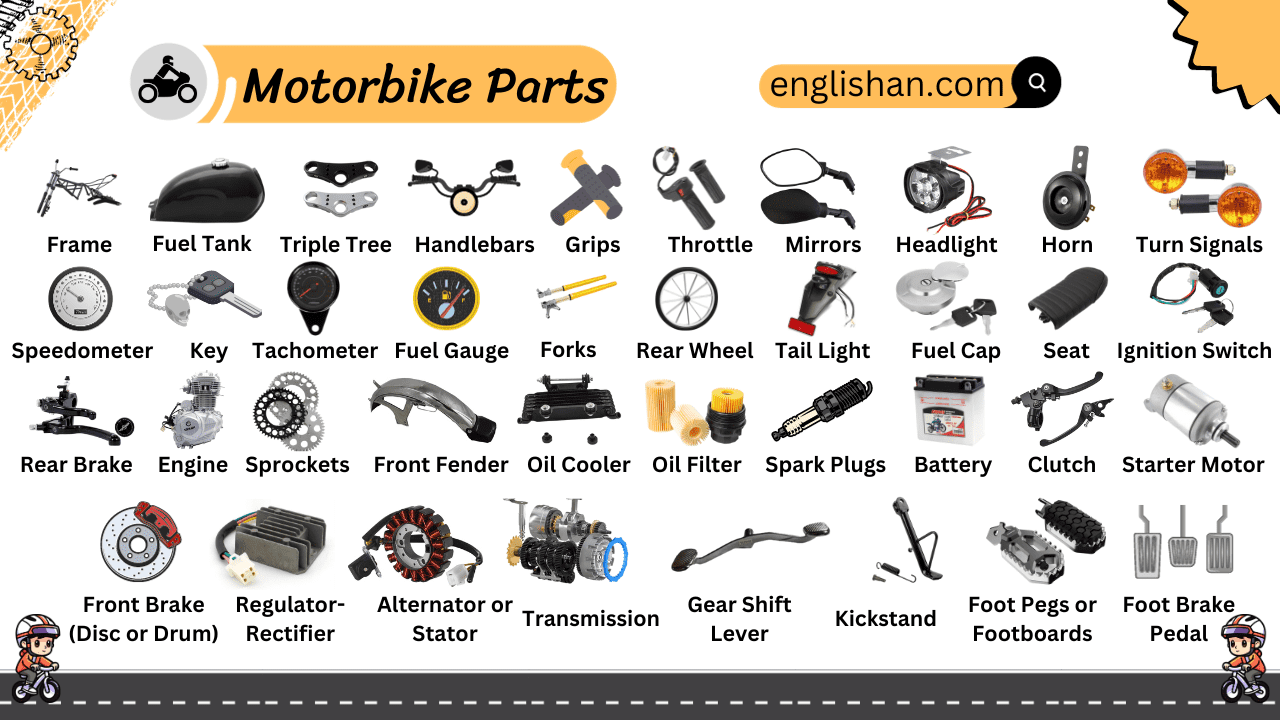A Deep Dive Into Performance Tuning with Bike Parts Wellington
A Deep Dive Into Performance Tuning with Bike Parts Wellington
Blog Article
Discover the Essential MotorBike Components You Required for Optimum Efficiency
Recognizing the vital parts of a bike is essential for achieving peak performance. Each part, from the engine to the stopping system, plays a vital duty in total capability and safety. Regular upkeep can prevent unexpected failings and enhance the riding experience. Nevertheless, many motorcyclists overlook the complexities of these systems. Discovering how they collaborate can bring about a more efficient ride. What essential elements should every rider prioritize?
The Engine: The Heart of Your Motorbike
The engine acts as the core element of a motorbike, driving its performance and defining its abilities. It is accountable for converting gas into mechanical energy, which powers the bike forward. Various kinds of engines are employed, consisting of single-cylinder, V-twin, and inline arrangements, each offering distinctive attributes fit for different riding functions and styles. The engine size, generally determined in cubic centimeters (cc), significantly affects efficiency, with larger engines normally giving even more power and torque.Furthermore, the engine's style and innovation, such as fuel shot systems or air-cooling versus liquid-cooling, affect performance and reliability. Upkeep is crucial for peak operation; factors like normal oil changes and monitoring ignition system warranty long life. Riders frequently take into consideration an engine's responsiveness and level of smoothness, as these characteristics boost the overall riding experience. Inevitably, the engine stays an important component that specifies not only the motorcycle's performance yet likewise the rider's link to the maker.
The Transmission: Shifting Gears Smoothly
The transmission plays a vital function in a motorcycle's efficiency, specifically in the mechanics of equipment shifting. Understanding just how to move gears efficiently can enhance the overall riding experience, while normal maintenance guarantees peak performance. Correct focus to these elements can considerably impact the long life and efficiency of the motorbike.

Equipment Shifting Mechanics
Smooth equipment shifting is important for excellent motorbike efficiency, greatly affecting both velocity and control. The auto mechanics of gear moving include the interaction between the clutch, equipment lever, and transmission system. When a rider engages the clutch, it disengages the engine from the transmission, permitting a gear adjustment without damaging the elements. A well-timed launch of the clutch, combined with specific movement of the gear bar, assists in a smooth change between gears. This procedure guarantees that the engine operates within its ideal power band, improving performance. Motorcycle Parts Auckland. Additionally, understanding the equipment proportions and their effect on rate and torque can help motorcyclists make notified selections throughout shifts, ultimately adding to an extra pleasurable and responsive riding experience
Maintenance Tips Significance
Routine upkeep plays an essential role in assuring that the transmission system operates effectively, enabling smooth gear changes. Routinely transforming the transmission and inspecting liquid is vital, as old liquid can cause enhanced friction and wear. In addition, checking the clutch for wear assurances peak involvement and disengagement, avoiding slippage throughout gear modifications. Lubrication of moving parts is similarly important to minimize rubbing and improve efficiency. Bike proprietors must additionally keep track of for leakages and uncommon noises, as these can show underlying problems. By adhering to these upkeep tips, motorcyclists can extend the life-span of their transmission system, ensuring that equipment shifts stay smooth and adding to the general performance of their motorbike.
The Braking System: Ensuring Safety on Every Trip
Braking systems are basic elements that straight affect a motorcycle's safety and performance. They contain numerous components, consisting of brake pads, rotors, calipers, and hydraulic lines, all interacting to guarantee efficient deceleration. The kind of braking system-- commonly either disc or drum-- influences responsiveness and quiting power.Regular maintenance is important to copyright peak performance; used brake pads can bring about lowered effectiveness and boosted quiting distances. Furthermore, the top quality of brake fluid need to be kept track of, as it can absorb dampness in time, endangering stopping efficiency.Riders need to likewise consider the value of anti-lock stopping systems (ABS), which prevent wheel lockup throughout abrupt stops, improving overall security. Appropriately operating brakes are not almost quiting; they infuse confidence in the motorcyclist, enabling much safer navigation via different surfaces. Ultimately, a reputable braking system is crucial for taking pleasure in every experience with assurance.
The Suspension: Enhancing Comfort and Control
A well-functioning shock absorber substantially contributes to a motorcycle's overall performance, matching the efficiency of the braking system. The suspension plays a significant duty in soaking up shocks from irregular surfaces, guaranteeing a smoother adventure while preserving tire contact with the road. This call is important for both stability and control, permitting cyclists to navigate corners with confidence and precision.Different sorts of suspension systems, such as telescopic forks or mono-shocks, supply varying levels of comfort and handling. Correctly tuned suspension boosts responsiveness, providing the cyclist with a more connected feeling to the motorcycle. Regular maintenance checks are necessary to ascertain the suspension components, including dampers and springs, are functioning at their best. An efficient suspension system not just raises the riding experience yet likewise contributes to the longevity of other motorbike parts by lessening wear and tear. As a result, buying top quality suspension is important for any type of severe motorcycle enthusiast.
The Tires: Connecting You to the Road
Tires play a necessary duty in a motorcycle's efficiency, acting as the primary web link in between the biker and the roadway. Comprehending the different kinds of tires available can considerably influence managing and security. Additionally, routine upkeep is crucial to guarantee peak tire efficiency and long life.
Tire Types Explained
How do different tire kinds affect a motorbike's efficiency? Tire kinds play a vital role in determining a motorcycle's grasp, handling, and stability. Sport tires, created for high performance, offer boosted grip and responsiveness on paved roadways, making them suitable for racing and hostile riding. Alternatively, touring tires focus on sturdiness and comfort, providing a smoother experience for long-distance traveling. Off-road tires, characterized by their tough tread patterns, master grip on unpaved surfaces, appropriate for experience fanatics. Additionally, dual-sport tires mix qualities from both on-road and off-road groups, accommodating versatile riding requirements. Inevitably, picking the appropriate tire kind is important for enhancing efficiency, ensuring safety and security, and enhancing the general riding experience.
Upkeep Tips Offered
While riding when traveling, keeping ideal tire condition is vital for safety and security and performance. On a regular basis inspecting tire stress is very important, as under-inflated tires can bring about poor handling and boosted wear. It is a good idea to inspect tread deepness often; used tires concession hold and stability. In enhancement, bikers should search for signs of damages, such as lumps or fractures, which can indicate the requirement for substitute. Rotating tires occasionally guarantees even wear, enhancing durability. Moreover, keeping tires clean from particles and staying clear of extreme visuals can prolong their lifespan. Keeping correct positioning and equilibrium adds to peak efficiency, decreasing anxiety on other bike components. Abiding by these maintenance pointers will greatly enhance the total riding experience.
The Fuel System: Fueling Performance and Efficiency
The fuel system plays a crucial duty in maximizing a motorbike's performance and efficiency, as it ensures the optimum shipment of fuel to the engine. It makes up numerous crucial components, including the fuel tank, fuel pump, fuel filter, and gas injectors or carburetor. Each component should function properly to ensure a smooth and powerful ride.The fuel storage a knockout post tank shops gasoline and supplies it to the engine by means of the gas pump, which creates the required stress. A fuel filter prevents pollutants from going into the engine, while the injectors or carburetor mix fuel with air for combustion.Proper maintenance of the gas system is crucial; a stopped up filter or malfunctioning injector can lead to lowered performance and increased fuel usage. By validating that the fuel Read Full Article system runs effectively, motorcyclists can take pleasure in improved throttle action, better gas economic situation, and overall improved riding experience.
The Electric System: Powering Your Ride
A reliable electrical system is vital for the total performance and security of a motorbike, as it powers important elements such as the ignition, lighting, and various digital systems. This system includes the battery, which stores power, and the generator, in charge of generating power while the engine runs. The wiring harness connects these components, guaranteeing dependable power distribution.Additionally, integrates protect the system from overloads, while relays assist control high-current gadgets with low-power signals. A properly maintained electrical system improves performance by ensuring smooth beginnings and regular operation of signals and lights, essential for cyclist presence and safety.Regular checks of the battery's charge and links are vital for stopping electric failings. Motorcyclists must additionally evaluate electrical wiring for damage, making certain all parts function ideally. Eventually, a robust electric system contributes considerably to the overall efficiency and reliability of the motorbike.
Regularly Asked Inquiries
How Often Should I Replace My Motorbike's Battery?
The frequency of motorbike battery substitute depends on usage and maintenance (Motorcycle Parts Auckland). Generally, batteries must be changed every three to five years. Regular checks can assist recognize when a substitute is required for peak efficiency
What Devices Do I Required for Basic Bike Maintenance?
For basic motorbike maintenance, one needs essential tools such as an outlet collection, wrenches, screwdrivers, pliers, tire pressure gauge, and a torque wrench. These tools promote effective upkeep and guarantee the motorbike runs successfully and securely.
How Can I Boost My Motorcycle's Aerodynamics?
To enhance motorbike the rules of aerodynamics, one must consider changing fairings, utilizing windshield expansions, maximizing body placement, and lowering overall weight. These modifications assist lessen drag, enhancing stability and fuel efficiency during experiences.
What Are the Signs of a Failing Electrical System?
Signs of a falling short electric system consist of dimming lights, difficulty starting, irregular instrument analyses, and blown fuses. Oem Parts New Zealand. Unusual smells or rust around battery terminals may also suggest underlying concerns requiring instant attention for safety and security and performance

How Do I Select the Right Oil for My Bike?
When picking oil for a bike, one should consider the manufacturer's specifications, viscosity scores, and the kind of riding. Additionally, conventional versus artificial oil can affect performance and engine security, affecting the decision significantly. The engine size, normally determined in cubic centimeters (cc), significantly influences efficiency, with bigger engines normally offering even more power and torque.Furthermore, the engine's style and modern technology, such as gas injection systems or air-cooling versus liquid-cooling, influence performance and dependability. A well-functioning suspension system significantly contributes to a motorcycle's general performance, enhancing the efficiency of the braking system. The fuel system plays a crucial role in taking full advantage of a motorcycle's performance and performance, as it ensures the optimum delivery look what i found of fuel to the engine. A gas filter protects against impurities from getting in the engine, while the injectors or carburetor mix gas with air for combustion.Proper maintenance of the gas system is vital; a blocked filter or malfunctioning injector can lead to lowered performance and raised fuel intake. A well-maintained electric system improves efficiency by making certain smooth begins and consistent procedure of lights and signals, vital for rider exposure and safety.Regular checks of the battery's cost and connections are important for protecting against electrical failings.
Report this page